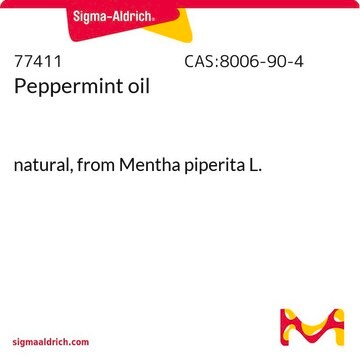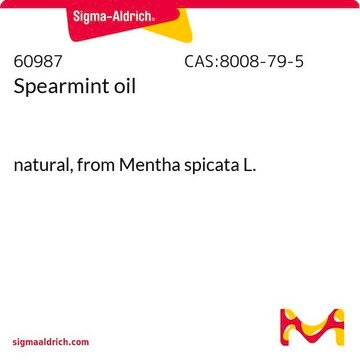W284823
Peppermint oil
purified by triple-distillation, FCC, FG
Synonym(s):
Mentha piperita
About This Item
Recommended Products
grade
FG
Kosher
Quality Level
reg. compliance
EU Regulation 1334/2008 & 178/2002
FCC
FDA 21 CFR 172.230
FDA 21 CFR 182.20
optical activity
[α]20/D −26°, neat
purified by
triple-distillation
origin
USA origin
refractive index
n20/D 1.461 (lit.)
bp
215 °C (lit.)
density
0.898 g/mL at 25 °C (lit.)
application(s)
flavors and fragrances
Documentation
see Safety & Documentation for available documents
food allergen
no known allergens
Organoleptic
peppermint
Looking for similar products? Visit Product Comparison Guide
Signal Word
Warning
Hazard Statements
Precautionary Statements
Hazard Classifications
Aquatic Chronic 2 - Skin Irrit. 2 - Skin Sens. 1
Storage Class Code
10 - Combustible liquids
WGK
WGK 1
Flash Point(F)
150.8 °F - closed cup
Flash Point(C)
66 °C - closed cup
Personal Protective Equipment
Choose from one of the most recent versions:
Already Own This Product?
Find documentation for the products that you have recently purchased in the Document Library.
Customers Also Viewed
Articles
Essential oils are complex natural extracts consisting of aromatic compounds and related organic chemicals. While they hold great value as fragrance and flavor ingredients, their significant risk of adulteration necessitates consistent formulator testing for quality, naturalness, and allergen levels.
Essential oils are complex natural extracts consisting of aromatic compounds and related organic chemicals. While they hold great value as fragrance and flavor ingredients, their significant risk of adulteration necessitates consistent formulator testing for quality, naturalness, and allergen levels.
Essential oils are complex natural extracts consisting of aromatic compounds and related organic chemicals. While they hold great value as fragrance and flavor ingredients, their significant risk of adulteration necessitates consistent formulator testing for quality, naturalness, and allergen levels.
Essential oils are complex natural extracts consisting of aromatic compounds and related organic chemicals. While they hold great value as fragrance and flavor ingredients, their significant risk of adulteration necessitates consistent formulator testing for quality, naturalness, and allergen levels.
Our team of scientists has experience in all areas of research including Life Science, Material Science, Chemical Synthesis, Chromatography, Analytical and many others.
Contact Technical Service










